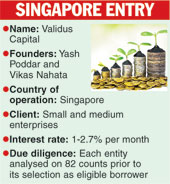Calcutta, June 5: Two Indian entrepreneurs have set up one of the first "peer to peer" lending start-ups in Singapore in association with the National University of Singapore and Dun & Bradstreet.
Founded by Yash Poddar and Vikas Nahata, Validus Capital Pte Ltd aims to hook up small and medium-sized enterprises (SMEs) of Singapore in want of cash with savvy investors across the globe having an appetite for risk through their online platform.

The addressable size of the debt market for the SMEs in the island nation is around 20 billion Singapore dollar. In spite of being the financial hub of Asia, most of the companies in Singapore are not serviced by big banks, leaving the $10-$100-million sized firms at the mercy of private moneylenders who charge an interest rate of 4-7 per cent a month.
"Validus offers loans at 1-2.7 per cent interest a month mainly to fund working capital needs and refinance expensive borrowings. It was a market ready to tap and we just bothered to look," Nahata, who is also the chief operating officer of Validus, said.
Validus analyses 82 variables of an entity before putting it up on its website and lets investors take an informed decision to lend. It allows loans of up to $1 million to a single SME for a period of up to 3-12 months. Companies seeking loans appear on the dashboard of the website and investors are allowed to pick and choose to fund as many borrowers as they like.
Validus does not assign credit rating to the loans, but prices them in a manner that clearly gives away the risk profile of the borrowers.
A research team headed by Sauvik Datta, who has over a decade's experience in risk assessment and mitigation in Standard Chartered, American Express and McKinsey, crunches data using credit rating default algorithm, developed by the Risk Management Institute of NUS, before taking a borrower on board and then prices the loan.
The risk management team first looks at the industry profile of the borrower, focuses on the financials of the firm and checks the credit worthiness of the owner.
"When crude was going down, we didn't take any borrower from the related sector. Now, marines is no-no as bunker rates have crashed," Nahata, a Wharton graduate, said.
In the next phase, Souvik's team analyses data provided by Dun & Bradstreet to ascertain the borrower's ability to pay. History of litigation, loan default, bankruptcy and money laundering are also looked into. It then checks the supplier's promptness to pay to the borrower by analysing a large pool of credit data.
Finally, it looks at the behavioural pattern of the promoter - credit card, mortgage, personal loan - to see his willingness to pay. "We were approached by a borrower with an impeccable record but we found him having a credit card loan surpassing the annual income. We declined the request. The company later defaulted," Nahata said.
Once the borrower is taken on board, the loan is priced based on risk assessment. If the borrower agrees to the rate, its offer is uploaded. Investors, who must have a Singapore bank account, can then shortlist the borrower and fund them.
Validus takes a 1 per cent cut from the borrower and one-fifth of the profit from the investors. It does not charge anything if investors don't make money.
Poddar and Nahata are not the first one to try such a model. Shanghai-based Lufax launched an online peer lending marketplace in 2011 and has become a multi-billion-dollar venture.
Validus wants to branch out to other Southeast Asian countries where jurisdiction is strong and data is trustworthy and India will not be counted among those. "It takes six months to resolve insolvency case. Here the legal process can take years. Moreover, the data cannot really be trusted in India," Nahata said. In Singapore, it is hoping to offer $1 billion loan in the next three years.
The start-up is at an advanced stage of striking a deal with an insurance firm that will underwrite up to 90 per cent of the loan if a borrower profile matches its risk assessment. Lufax is already doing so.










